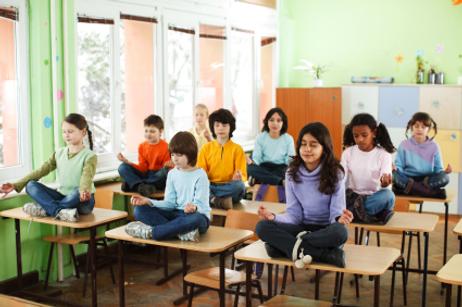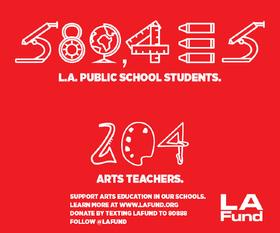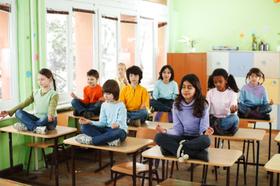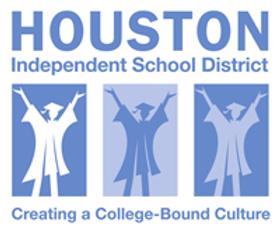A new trend appears to be sweeping some public school districts despite the alarm by a handful of parents. Yoga has recently been introduced into several school systems nationwide, allowing students to stretch, breathe, and focus their bodies and minds during a busy school day. While many tout the new program as a healthy way for students of all ages to gain additional fitness benefits, some are concerned that the religion attached to the movements violates the separation of church and state in public schools.
Introducing Yoga to California Students
One school district that has fully embraced the health benefits of yoga in public schools is Encinitas Union School District in North San Diego County, California. The North County Times reports that the yoga program has been going strong in some district schools over the past three years. Thanks to a $533,000 grant from the K.P. Jois USA Foundation this year, the program has expanded throughout the district.
The publication reports that approximately half the schools in Encinitas now offer yoga instruction for 30 to 40 minutes twice a week. Yoga joins other enrichment programs offered in the district, including music, reading, and gardening. The additional classes serve a dual purpose: instructing students in new subjects while freeing up teacher time for planning and other duties.
The schools, which claim to have removed all religious references from their yoga program, assert that the yoga sessions provide valuable physical fitness to students. Yoga is also somewhat unique from other types of fitness programs because it teaches students stress reduction and management and the health benefits of exercise. Students learn deep breathing techniques that relax their minds and bodies.
This video describes yoga for the classroom.
The Problem with Yoga
While yoga has been part of public school instruction since 2001, when YogaEd launched a pilot program, some Encinitas parents have voiced concern over the recent spread of the program into more of their schools. According to Diets in Review, these parents have expressed their worries over the potential for religious indoctrination by bringing yoga into the classroom. Ashtanga yoga, taught in Encinitas classrooms, has traditionally been tied to Hinduism.
However, school officials have tried to reassure parents that the discipline's religious aspects have been removed from classroom instruction. Tim Baird, superintendent of Encinitas schools, explained to Diets in Review that students and traditional deep breathing techniques are currently taught the positions. Baird adds that the benefits of yoga, including stress relief and relaxation, have proven beneficial to the students.
Some parents do not agree. They have threatened to sue the school district if they don’t stop teaching yoga in the classroom, according to a report at United Press International.
“There’s a deep concern the Encinitas Union School District is using taxpayer resources to promote Ashtanga yoga and Hinduism, a religion system of beliefs and practices,” Dean Broyles, an attorney representing the parents, stated in an email to Superintendent Baird. Broyles also warned of legal action if a move was not made to take yoga out of the schools. Concern was also raised about taxpayer dollars supporting a program with religious teaching in the schools.
This video describes Bright Kids Yoga, a collaborative project teaching yoga in schools in rural northeastern Pennsylvania.
No Indoctrination, Health Benefits Primary Focus
The school district assures parents that no religious teaching accompanies yoga instruction and insists that the health benefits make this a program worth keeping. One of the Encinitas school board members and a yoga participant told the North County Times that parents and their attorney are looking for a problem when none exists. She stated that while parents can object and even keep their children out of the activity, getting rid of the program for all students would be unfortunate. To date, only a few children are currently participating in the yoga sessions at their schools.
The assistant superintendent of Encinitas, David Myashiro, agrees. Myashiro told the North County Times that the schools are not teaching religion – not because it is unconstitutional, but simply because that is not their policy. He added that the yoga sessions provided healthy student benefits based on early program assessments.
“I think we’re slowing down the game at school a little bit so kids can be more thoughtful about what they’re doing and learn how to deal with stress and pressure, whether that’s coming from a test or coming from another kid,” Myashiro told the North County Times.
Yoga Works in New York
California is not the only state that has introduced yoga into its school day. Staten Island Alive reports that several Staten Island schools are now incorporating yoga as well. Instructors from Time for Yoga have visited several schools to demonstrate yoga techniques to the students. Classes have been taught at the elementary, middle, and high school levels, hoping to get students of all ages interested in the ancient practice. The program aims to promote both the health and peace benefits of yoga while addressing the obesity epidemic sweeping schools across the country.
This video illustrates how Cambridge Public Schools in Massachusetts trains its teachers to create a calmer and more balanced classroom environment through yoga.
While Staten Island continues to explore the possibility of yoga in public schools, the fight in California appears to be far from over. Yoga classes in Encinitas schools will be expanded to additional school locations in January, furthering parents' concerns while extending the discipline's health benefits to more students across the district.
Questions@ Contact us on Facebook. @publicschoolreview















